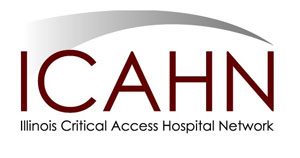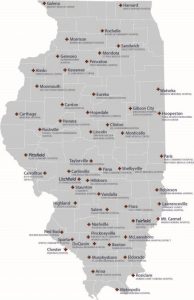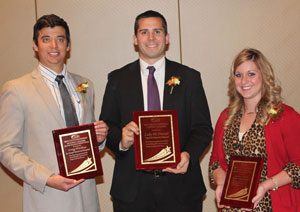May 31, 2016
Illinois Network Puts Hospitals' Needs First
by Jenn Lukens
 At the start of
the 21st century, a shift was happening among
Critical Access Hospitals (CAHs) in Illinois.
Longstanding walls of separation crumbled as competing
hospitals began organizing to share ideas and become a
unified voice.
At the start of
the 21st century, a shift was happening among
Critical Access Hospitals (CAHs) in Illinois.
Longstanding walls of separation crumbled as competing
hospitals began organizing to share ideas and become a
unified voice.
 The momentum created was too
great to ignore. The
Illinois Department of Public Health (IDPH), Center for
Rural Health capitalized on this opportunity to
support the hospitals' desire to move from competition to
collaboration. They asked Pat Schou, IDPH's
Medicare Rural Hospital Flexibility Program (Flex)
and
Small Hospital Improvement Program (SHIP)
coordinator, to help the hospitals establish the Illinois Critical Access Hospital
Network (ICAHN). Schou led the charge as executive
director and, in 2004, ICAHN incorporated as a 501(c)(3).
The momentum created was too
great to ignore. The
Illinois Department of Public Health (IDPH), Center for
Rural Health capitalized on this opportunity to
support the hospitals' desire to move from competition to
collaboration. They asked Pat Schou, IDPH's
Medicare Rural Hospital Flexibility Program (Flex)
and
Small Hospital Improvement Program (SHIP)
coordinator, to help the hospitals establish the Illinois Critical Access Hospital
Network (ICAHN). Schou led the charge as executive
director and, in 2004, ICAHN incorporated as a 501(c)(3).
Through its mission, "to strengthen Illinois Critical Access Hospitals through collaboration," ICAHN provides the environment and tools for rural hospitals to become healthy and sustainable healthcare sources for their communities.
A Cohesive Operation
Securing all 51 of Illinois's CAHs and 3 small rural hospitals as voluntary members of ICAHN was no easy feat. Schou and her team have proactively connected with hospital leaders and staff to build trust. "We have a close relationship with the hospitals and have a finger on the pulse of their needs," she said.

Since its beginning, ICAHN's primary focus has been providing assistance to meet the needs of rural hospitals across the state. Soon after incorporating, ICAHN coordinated focus groups, conducted needs assessments, and distributed surveys among hospital staff. From there, they established services, programs, and educational opportunities that met the needs expressed. Through ICAHN, member hospitals can now operate cohesively, communicate collectively, and gain purchasing power.
"ICAHN works almost like a clearinghouse. Hospitals can share their resources and save some money by being a part of this network instead of going in all different directions," explained Schou.
Like Schou, many of ICAHN's employees have a rural healthcare background, making them empathetic to the struggles and needs of the network's hospitals. Even with the staff's expertise, Schou primarily attributes ICAHN's success to the enthusiasm of its hospitals.
"The hospitals came together because they saw…the homogeneity of the system. They liked being able to network with hospitals the same size. The cohesiveness came from members who were able to share ideas and operations," stated Schou. "It's really their organization. We just provide the support for it."
The cohesiveness came from members who were able to share ideas and operations. It's really their organization. We just provide the support for it.
ICAHN has been championed by many stakeholders — like Nancy Newby, one of the first to serve as president of the network's board. As CEO of the Washington County Hospital, she set the tone for the 10 other presidents that followed. She continues to remain involved to this day. ICAHN is governed by nine-member Board of Directors made up of member hospital executives. Schou commended the board's work, "Their commitment, support, and ongoing leadership has been part of the success of ICAHN."
Establishing a Presence
At the start of the network, ICAHN was largely dependent upon IDPH. Now, the two organizations are more like extensions of each other. ICAHN's close relationship with the hospitals provides a trusted avenue by which IDPH can directly assist CAHs and other rural hospitals. In turn, IDPH provides staff, funding, and resources that ICAHN could not have otherwise afforded.
ICAHN has been careful to avoid duplicating the efforts of other health-related organizations in Illinois. Because of this perspective and IDPH's help, ICAHN has created a niche for themselves that has attracted many statewide and national partners.
It's easy to do what you have always been doing, but then you are not relevant. Do your best to stay relevant.
Schou says that the courage to find solutions for present needs is what has made ICAHN stand out. "You have to be somewhat proactive and willing to take that next step, to take a risk," she said. "It's easy to do what you have always been doing, but then you are not relevant. Do your best to stay relevant."
ICAHN's relevancy comes from years of positive results by putting its hospitals' needs first. Since ICAHN'S founding, Schou's work has caught national attention. A winner of the Flex Program's 2013 Calico Leadership Award and the 2015 National Rural Health Association's (NRHA) President's Award, Schou was also elected to the position of Secretary of the NRHA in 2015 where she is working to assist rural hospitals and networks across the nation.
Leveraging FORHP Funds

IDPH has received grants from the Federal Office of Rural Health Policy (FORHP), a few of which are subcontracted to ICAHN. Both Flex and SHIP have been administered by ICAHN on behalf of IDPH since 2004. These project awards have allowed ICAHN to offer a variety of services for its hospital members, including trainings, information technology services, and provider recruitment.
"I think it's interesting how, when hospitals are so often in competition with one another for business, ICAHN has found a way to get them to network and partner successfully," stated Megan Meacham, senior advisor at FORHP and former project officer for several grant programs managed by ICAHN. Many of ICAHN's innovations made possible through FORHP funds have stood out to Meacham as effective ways for rural hospitals to share ideas and resources.
One of ICAHN's most notable accomplishments was being approved by the Centers for Medicare & Medicaid Services as a vendor for Hospital Consumer Assessment of Health Providers Systems (HCAHPS). This patient satisfaction survey gives patients an opportunity to offer suggestions to improve their hospital's inpatient, outpatient, and emergency room services. ICAHN's HCAHPS program has also expanded and is being used in seven other states.
A widely used ICAHN service is the Peer Network Groups. These are open to all staff of member hospitals as a communal and confidential way to give and glean information from like professionals. Quarterly meetings, advisory teams, and educational sessions provide a solid ground for collaboration between professions. Members can continue conversations through Listservs, a secure online interactive portal.
We don't just connect the hospitals at the CEO level. We connect physical therapists to other physical therapists and nurses to other nurses.
These services provide an open communication system to share problem solving techniques, product ideas, and staffing questions. "We don't just connect the hospitals at the CEO level. We connect physical therapists to other physical therapists and nurses to other nurses. The whole hospital is a member of the network. That's why the hospitals like it – they are all connected and can get needed resources," explained Schou.
Motivating through Incentives
ICAHN not only offers practical services for members, but also incentives to encourage improved patient satisfaction and customer service. Recognitions like the Innovation of the Year Award and Young Leader Award applaud those who have gone above and beyond in their work.
Hospitals are also given project awards distributed by ICAHN. "Programs know they have achieved something if awarded a grant from ICAHN. It gives leverage and credibility to the organization," said Julie Casper, IDPH State Office of Rural Health (SORH) Program Director.

Encouraging professional growth is very important at ICAHN. Executive trainings, staff trainings, and supervisory workshops conducted by hospital staff provide continued education from attendees' peers.
ICAHN shares quality and performance metrics of each member hospital benchmarked against those of larger hospitals outside of their network. Members appreciate the opportunity to compare themselves to others and conversations about how to improve are sparked. Through these collaborative discussions and healthy competitions, ICAHN has raised the bar of healthcare services in Illinois while helping everyone achieve their goals.
Accepting New Challenges
As someone who works closely with ICAHN, Casper knows its success came with extreme dedication and drive to serve. "It has taken a lot of work and effort to get to where we are today. Recognizing that ICAHN is a leader is not something that can be overlooked," said Casper.
With their mission to help hospitals through quality services, ICAHN anticipates the need to evolve in order to better serve its hospitals in the future. "As they accept new challenges, we accept new challenges," says Schou. In the ever-changing world of healthcare, this attitude of adaptability has been key to the hospitals' survival. They are now able to compete with larger hospitals that have more resources.
If you want to integrate and have an operational network, be multi-faceted and open-minded to change. We have been very careful to listen and respond to members. If a hospital has a need or issue, you have to act.
"If you want to integrate and have an operational network, be multi-faceted and open-minded to change. We have been very careful to listen and respond to members. If a hospital has a need or issue, you have to act," said Schou.
